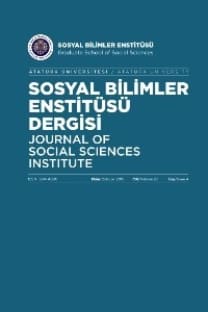ON YEDİNCİ YÜZYIL FELSEFESİNDE BİLİNÇ KAVRAMININ ANALiTİK AÇIDAN DEĞERLENDİRİLMESİ
Öz
On Yedinci Yüzyıl Felsefe Tarihi içerisinde yer alan Rene Descartes,Thomas Hobbes, Gottfried Wilhelm Von Leibniz ve John Locke en önemlikonulardan biri olarak ele aldıkları bilince yönelik son derece değisik açıklamalargetirmislerdir. Bu bağlamda Descartes’a göre bilinçli olmak bir reflexion yanidüsünme üzerine düsünmedir. Dolayısıyla bilinç bize doğrudan doğruya verilenbir gerçektir. Ancak bilinç gerçeğin bütünü değil sadece bir parçasıdır. Diğertaraftan Hobbes için bilinç hafızadan baska bir sey değildir. Leibniz ise bilincihafızanın bir formu olarak ele almaktadır. Ayrıca Locke’a göre biz yaptığımız herakli davranısın bilincindeyiz ve bilinç insan aklından geçenlerin algılanmasıdır.Yaptığımız bu çalısmada Descartes ve Locke daha farklı bir bilinç anlayısısergilerken, Hobbes’un ve Leibniz’in bilinç tanımlamaları kısmen birbiriyleörtüsmektedir.Anahtar Kelimeler: Akıl, bilinç, düsünce, hafıza, zihin, imaj, algı, dikkat, yansıtma Abstract : Rene Descartes, Thomas Hobbes, Gottfried Wilhelm Von Leibniz andJohn Locke, all representatives of seventeenth century philosophy, made variousstatements on the important matter of consciousness. Accordingly Descartes seesthe state of being conscious as a reflexion, a thought on thought. Thereforeconsciousness is a truth given to us directly but consciousness is only a part of thetruth. On the other hand where Hobbes sees consciousness only memory, Leibnizsees it as a form of memory. According to Locke we are conscious of everymental act we undertake and thus consciousness is the awareness of the human ofhis thought. This study shows that Descartes and Locke have different views onconsciousness while those of Leibniz and Hobbes overlap.Key Words: Reason, conscious, thought, memory, ıntellect, ımage, perception,attention, reflection
